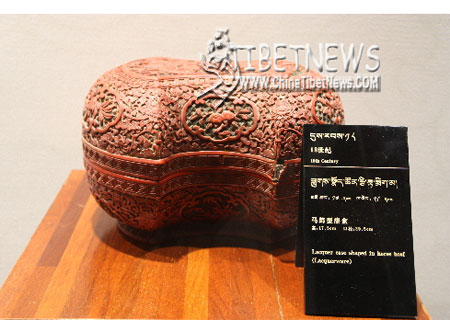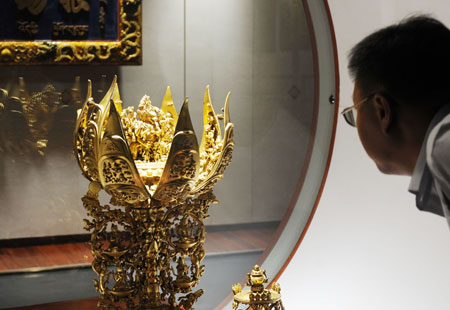About 200 items of cultural relics and pictures were exhibited in the Treasure Hall of the Potala Palace on Saturday.
The exhibition of this hall is made up of two major parts, namely "Review of History" and "Treasures of Potala."
The current exhibits in the treasure hall include rarely shown cultural relics as well as innermost records and profiles. Exhibits display artifacts and information, from which one can learn about the society in ancient Tibet and the changes it has experienced throughout the years. Visitors can also watch displays demonstrating the process of making local arts, food and drinks.

A cultural relic is exhibited in the Treasure Hall of Potala Palace in Lhasa, capital of southwest China's Tibet Autonomous Region,July 18, 2009. 200 items of cultural relics and pictures are exhibited in the treasure hall, which will soon be opened to the public.(photo: Chinatibetnews.com)
The Potala itself is a treasure house, since it contains the golden handwritten Buddhist scriptures, valuable gifts from Chinese emperors, and priceless antiques. There are many colorful sculptures and paintings chronicling Buddhist folklore and ancient Tibetan life. Most of the artifacts are already on display at the Treasure Hall which is about to open.

A visitor views a Buddhism sculpture made in the 14th century in the treasure hall of the Potala Palace in Lhasa, capital of southwest China's Tibet Autonomous Region, July 18, 2009. Some 200 cultural relics are exhibited in the treasure hall, which will soon be opened to the public. (Xinhua/Chogo)
The Treasure Hall of the Potala Palace stands as a three-story building, located in the Zhol below the palace. The hall covers an area of over 2,000 sq meters, and has required considerable investment in the region of some 10 million Yuan. The opening-up of the Treasure Hall also functions as a measure to relieve the intense pressure placed upon the Potala Palace by visiting crowds.
Zhol, meaning "below" in Tibetan, refers specifically to a village or town right below a mountainside castle. Zhol City (Xuecheng), also known as Snow City, is located on the lower boundary of the Potala Palace entrance. Since its grand opening on May 31st, 2007, Zhol City has become a popular tourist hotspot in Lhasa.
